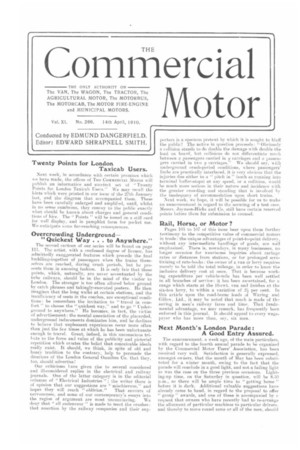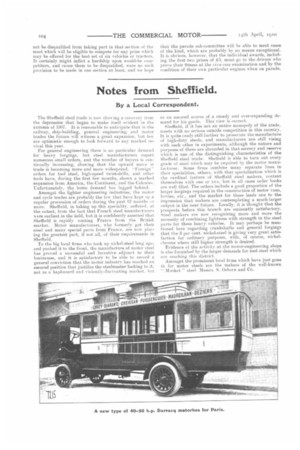Twenty Points for London Taxicab Users.
Page 1

Page 2

If you've noticed an error in this article please click here to report it so we can fix it.
Next. week, in accordance with certain promises which we have made, the offices of nit,. ComM.IiRcIAT. MOTOR will publish an informative and succinct set of " Twenty Points for London Taxicab Users." We may recall the hints which were printed in our issue of the 27th January last, and the diagram that accompanied them. These Loire been carefully enlarged and amplified, until, whilst in no sense cumbrous, they convey to the public exactly what should be known about charges and general conditions of hire. The " Points " will be issued on a stiff card for wan display, and in pamphlet form for pocket use. We anticipate some far-reaching consequences.
Overcrowding Underground " Quickest Way . . . to Anywhere."
The second cartoon of our series will be found on page 111. The artist, with a confessed degree of licence, has admittedly exaggerated features which precede the final huddling-together of passengers when the trains themselves are reached, during crush periods, but he preaents them in amusing fashion. It is only fair that these points, which, naturally, are never accentuated by the tube railways, should be in the mind of the visitor to London. The stranger is too often allured below ground by catch phrases and takingly-executed posters. He then imagines that the long walks at certain stations, and the insufficiency of seats in the coaches, are exceptional conditions: he remembers the invitation to " travel in comfort " to choose the " quickest way," and to go " Underground to anywhere." He becomes, in fact, the victim of advertisement: the mental association of the placarded, underground inducements dominates him, and he declines to believe that unpleasant experiences recur more often than just the few times at which he has been unfortunate enough to travel. Great, indeed, in this unconscious tribute to the force and value of the publicity and pictorial repetition which craates the belief that conceivable ideals really exist. It should, we think, in spite of old and hoary tradition to the contrary, help to persuade the directors of the London General Omnibus Co. that they, too, should advertise!
Our criticisms have given rise to several considered and ill-considered replies in the electrical and railway journals. One of the latter category is in the editorial columns of " Electrical Industries "; the writer there is of opinion that our suggestions are " mischievous," and hopes they will reach oblivion." That savours of nervousnes.s, and some of our contemporary's essays into the region of argument are most unconvincing. We deny that " all endeavour " is made to meet the crushes: that assertion by the railway companies and their sup
porters is a specious pretext by which it is sought to bluff the public! The notice in question proceeds: " Obviously a vellision stands to do double the damage with double the load on board, but collisions do not differentiate much between x. passengers carried in y carriages and a: passengers carried in two y carriages." We should say, with underground crush-period conditions, where passengers' limbs are practically interlaced, it is very obvious that, the injuries due either to a " pitch in " (such as running into terminal buffer-stops) at any speed, or a collision, would be much more serious in their nature and incidence with the greater crowding and standing that is involved by the inadequacy of accommodation upon short trains.
Next week, we hope, it will be, possible for us to make an announcement in regard to the securing of a test case. Messrs. Joynson-Hicks and Co. still have certain reserved points before them for submission to counsel.
Rail, Horse, or Motor ?
Pages 105 to 107 of this issue bear upon them further testimony to the competitive value of commercial motors in trade: the unique advantages of point-to-point delivery, without any intermediate handlings of goods. are well emphasized. There is, nowadays, in many businesses, no longer occasion for wearisome inquiries about cartage rates or distances from stations, or for prolonged scrutinizing of rate-books: the owner of a van or lorry requires merely to he told the total mileage, in order to know the inclusive delivery cost at once. That is because working expenditure per vehicle-mile has been well settled in all branches of service: it has been ascertained, for a range which starts at the 10-cwt. van and finishes at the six-ton lorry, to within a variation of Di per cent. Tr, this article upon the road-borne loads af Waring and Gillow, Ltd., it may be noted that much is made of thysaving in men's railway fares and time. That fundamental advantage, we may remark, has frequently been enforced in this journal. It should appeal to every wagepayer who has more than, say, six men.
Next Month's London Parade: A Good Entry Assured.
The announcement. a week ago, of the main particulars, with regard to the fourth annual parade to be organized by the Commercial Motor Users' Association, has been received very well. Satisfaction is generally expressed. amongst owners, that the month of May has been substituted for a winter month, owing to the fact that the parade will conclude in a good light, and not a failing light as was the case on the three previous ()evasions. Lighting-up time, on the Saturday in question, will he 8.50 p.m., so there will be ample time to " getting home " before it is dark. Additional valuable suggestions hare already come to hand, in regard to the proposal to offer " group " awards, and one of these is accompanied by a request that owners who have recently had to re-arrange the allotment of particular machines to particular drivers. and thereby to move round some or all of the men, should not be disqualified from taking part in that section of the meet which will be eligible to compete for any prize which may be offered for the best set of six vehicles or tractors. It certainly might inflict a hardship upon would-be competitors, and cause them to be disqualified, were no such provision to be made in one section at least, and we hope
that the parade sub-committee will be able to meet cases of the kind, which are probably by no means exceptional. It is obvious, however, that the individual awards, including the first two prizes of :C5, must go to the drivers who prove their fitness at the rira-roce examination and by the condition of their own particular engines when on parade.






















